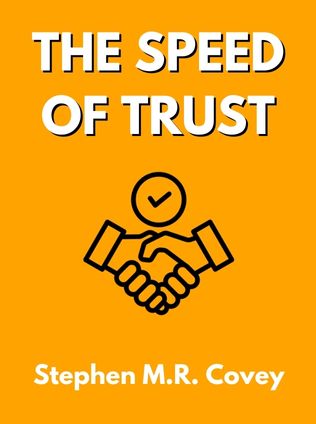
The Speed of Trust
The One Thing that Changes Everything
By Stephen M.R. Covey
Published 10/2006
About the Author
Stephen M. Covey, a renowned author, and business leader, is best known for his book The 7 Habits of Highly Effective People. Covey's work has inspired millions of individuals and organizations worldwide to improve their effectiveness and build strong, trust-based relationships. In The Speed of Trust, Covey delves into the critical role that trust plays in both personal and professional success.
Main Idea
Trust is not merely a "nice-to-have" quality; it is a fundamental business asset that delivers quantifiable economic value. When trust is high, the speed of execution increases, and costs decrease. Trust can be actively built and enhanced, transforming it from an intangible concept into a tangible economic driver.
"Trust impacts us 24/7, 365 days a year. It undergirds and affects the quality of every relationship, every communication, every work project, every business venture, every effort in which we are engaged. Contrary to what most people believe, trust is not some soft, illusive quality that you either have or you don’t; rather, trust is a pragmatic, tangible, actionable asset that you can create – much faster than you think possible. I am also convinced in every situation nothing is as fast as the speed of trust. And, contrary to popular belief, trust is something you can do something about. In fact, you can get good at creating it." – Stephen M. Covey
Table of Contents
- Wave 1 – Self Trust
- Wave 2 – Relationship Trust
- Wave 3 – Organizational Trust
- Wave 4 – Market Trust
- Wave 5 – Societal Trust
- Summation – Inspiring Trust in Others
Analyzing and Explaining Each Idea
Wave 1 – Self Trust
Self-trust is derived from your abilities and your capacity to set and achieve goals and keep commitments. If you walk your talk, then you’ll feel good about your actions. That inner sense of contentment and consistency then makes it possible for you to be worthy of the trust of others. Credibility is derived from four core sources which you should seek to build: (1) Integrity; (2) Intent; (3) Capabilities; and (4) Results.
Integrity means acting in accordance with your personal values and belief system at all times and in all circumstances. It involves congruence, humility, and courage. Covey suggests several ways to increase integrity:
- Make and keep personal commitments to yourself.
- Stand for something bigger than yourself by creating a personal mission statement.
- Be candid and open to new and different ways to achieve the right things.
"I look for three things in hiring people. The first is personal integrity, the second is intelligence, and the third is a high energy level. But, if you don’t have the first, the other two will kill you." – Warren Buffett, CEO, Berkshire Hathaway
Intent is about your motives, agenda, and behavior. The key components of intent are:
- Motives – the reason for doing one thing and not another.
- Agenda – what you intend to achieve, seeking mutual benefit and win-win outcomes.
- Behavior – acting in the best interests of others.
"The measure of your life will not be in what you accumulate, but in what you give away." – Dr. Wayne Dyer, author, The Power of Intention
Capabilities refer to your talents, skills, knowledge, capacities, and abilities that enable you to perform with excellence. Covey uses the acronym "T-A-S-K-S" to describe the different dimensions of capabilities:
- Talents – natural gifts and strengths.
- Attitudes – ways of getting things done.
- Skills – proficiencies or the things you do exceptionally well.
- Knowledge – learning, insights, understanding, and awareness levels.
- Style – the way you approach challenges combined with your personality traits.
"The complacent company is a dead company. Success today requires the agility and drive to constantly rethink, reinvigorate, react, and reinvent." – Bill Gates, chairman, Microsoft
Results are your track record of reaching milestones and tangible goals. Covey emphasizes the importance of personal responsibility and continuous improvement:
- Take personal responsibility for your results.
- Expect to win each time and prepare accordingly.
- Learn to be a strong finisher, as results are about finishing what you start.
"It’s no use saying, ‘We are doing our best’. You have got to succeed in doing what is necessary." – Winston Churchill
Wave 2 – Relationship Trust
Relationship trust is about how you establish and increase the virtual trust accounts you have with other people. High-trust leaders exhibit 13 behaviors:
Sign up for FREE and get access to 1,400+ books summaries.
You May Also Like
The Subtle Art of Not Giving a F*ck
A Counterintuitive Approach to Living a Good Life
By Mark MansonRich Dad Poor Dad
What the Rich Teach Their Kids About Money - That the Poor and Middle Class Do Not!
By Robert T. KiyosakiHow To Win Friends and Influence People
The All-Time Classic Manual Of People Skills
By Dale CarnegieQuiet: The Power of Introverts
The Power of Introverts in a World That Can't Stop Talking
By Susan Cain



















